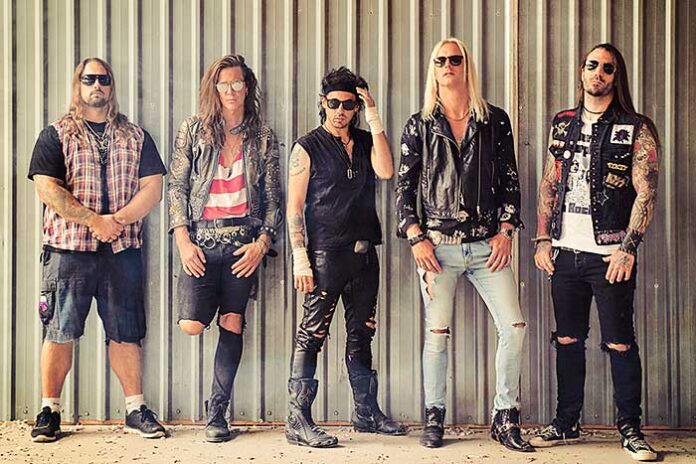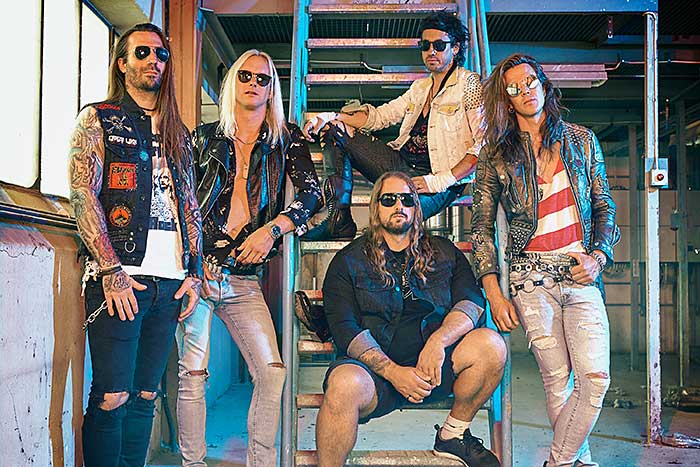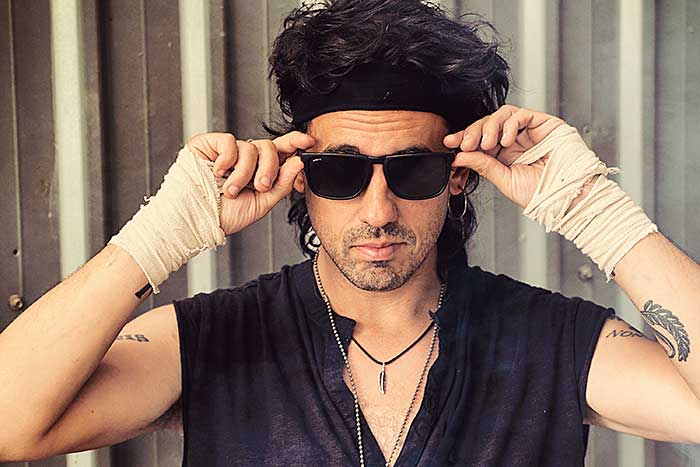
INTERVIEW WITH DANNY REXON BY GEORGE PACHECO
PHOTOGRAPHS BY NILS SJÎHOLM
The idea of delivering high-octane, old school, Sunset Strip inspired rock ‘n’ roll is nothing new, and Sweden’s Crazy Lixx is arguably the best band at it, consistently delivering all of the over-the-top elements that helped define a most over-the-top decade (the 80s, duh), but in a very dynamic way. There’s a wealth of American and European influences that have permeated Crazy Lixx’s music from the very beginning, and their latest, Street Lethal, sits alongside some of the band’s best work. It’s heavy when it needs to be, it’s a ripper when it wants to be, and it’s always melodic. Vocalist and producer Danny Rexon seems to have it all under control, as he discusses the current state of Crazy Lixx and Street Lethal.
Is it difficult for you to compare one album to the next? How does Forever Wild compare to this new one, Street Lethal?
When we started doing this album, we weren’t really in the zone. I wasn’t very interested in doing a new album, because it felt like we weren’t really completed with the last one. Due to the pandemic, we didn’t get to tour as much as we wanted, and in my opinion, had the best part of the tour still waiting for us.
“WHEN THE LABEL REACHED OUT AND TOLD US WE NEEDED TO START WORKING ON THE NEXT ALBUM, WE DIDN’T REALLY FEEL LIKE DOING IT.”
We had plans for the US and we had plans for Australia, among other places, so we were quite bummed, of course, that we didn’t get to do that. So, when the label reached out and told us we needed to start working on the next album, we didn’t really feel like doing it. But we realized after a while that the pandemic was going to go on longer than we thought. At first, we postponed the shows, but we eventually knew that we had to cancel it all. That was a hard pill to swallow, but we knew we had to move on to the next album. So, it started out a bit differently, because we were a lot more inspired when we started Forever Wild. The inspiration did come for Street Lethal in time, and the process of composing the album was not very different in the end. Whereas the recording was a bit different, because we tried to stay as few people at a time recording. So, it was me and the person I was going to record, and we did some recording long distance, as well.

Classic, hard rock ‘n’ roll doesn’t have to be about reinventing the wheel, but having the dynamics is super important, and Crazy Lixx delivers every time. You never skimp on the harmonies, melodies, hooks, and all of the ingredients that make this music sound so good. Is that something you focus on when writing, to make each song as dynamic as possible?
I always try to produce the demos for the album as complete as possible, so all of those nuances that you say you hear—the melodies and harmonies—are already in the song at the demo stage so you get to hear something that’s very close to the final product. Like you said, though, the vocal harmonies, for example, take a long time to do. There are multiple singers involved, and you have to sing a lot of takes to get those massive gang vocals, but those really belong in the genre and I do a lot to get the necessary sound. I never skimp on the work that’s required to get that kind of sound. We do what we have to do to get it to work.
How successful was the collaboration for the Friday the 13th video game in raising the visibility of Crazy Lixx? Was it fun working with those developers?
We were in quite a bad place at the time when we got the request from the developers of the game, because we had just lost two guitarists and we were in the place where we weren’t really sure if we were going to move on. So, we were looking for new members, and we got this request from the developers. That got my inspiration and the juices flowing, and it actually set the whole mood for the Ruff Justice album, because the horror theme came after, due to the fact that we had recorded the songs for the Friday the 13th game. So, that was something that we also used for the next two albums. For Forever Wild, we tried early on to have a loose concept. We had the horror concept with Ruff Justice, and we envisioned a soundtrack to a Top Gun or Iron Eagle styled action/fighter pilot movie for the inspiration for Forever Wild.
“THIS TIME WITH STREET LETHAL WE ENVISIONED OURSELVES DOING A SOUNDTRACK TO A MARTIAL ARTS MOVIE FROM THE 80S OR 90S.”
This time with Street Lethal we envisioned ourselves doing a soundtrack to a martial arts movie from the 80s or 90s. The game meant a lot to us, though, and we noticed that we reached a lot of fans due to the game, especially in the US. I was really happy with that, and I’m always very interested in being featured in movies or games. It’s a great way to reach out to new audiences that don’t actively look up music. A lot of young people don’t even know the genre exists, because it is a genre that died, mostly, in the mid 90s. If you were born after that time, you may not even be aware that kind of music exists, if you’re not actually looking for it. So, if you have it passively within something else that you’re consuming, some other entertainment, it’s a great way to get heard. We’re really happy with the collaboration overall.

How much influence does Sweden’s classic metal and glam history influence Crazy Lixx? Whether it’s Easy Action’s appearance in Blood Tracks or the heavy melody in a band like Treat or Europe, to your contemporaries in Crashdiet and Hardcore Superstar, do you feel like Crazy Lixx is part of something bigger?
We were very much put into the genre of the two last bands that you mentioned when we started out, and mostly I’ve been inspired by American and British bands. The Swedish scene when I was growing up had Europe, like you mentioned, which was an international hit. Apart from that, however, you didn’t have many Swedish rock bands, in that sense. The music exported from Sweden has always been big, but not when it comes to rock music. We haven’t been very successful in that respect. I remember one of the first songs I really liked when I was a small kid was “The Final Countdown” by Europe. A song like that inspired me very much, so Europe has always been an inspiration for us. I wouldn’t say that Crashdiet or Hardcore Superstar were inspirations musically, but they were inspirations because they showed us and others in Sweden that there actually was a scene and an audience that wanted to hear this kind of music again. They released their albums in 2005, I believe, and that kick started the genre in Sweden, and we could live off the same audience they attracted.
“IT’S INSPIRED BY THE FICTIONAL 90S ACTION MOVIE FINAL FURY. THAT’S VERY IMPORTANT AND SETS THE MOOD FOR THE LISTENER”
Street Lethal feels very cinematic. “Final Fury” is a killer instrumental that sounds straight out of an 80s montage, “Enter the Dojo” sets the mood for what’s about to strike, and “One Fire – One Goal” would fit great during the end credits. Does heavy metal’s pedigree with horror and action soundtracks feed into your inspiration, and was it intentional to filter that into this album a bit more?
Yes, very early on we tried to imagine that we were writing a soundtrack for a movie, and it even says in the liner notes that it’s inspired by the fictional 90s action movie Final Fury. That’s very important and sets the mood for the listener, so that they get the same kind of imagery in their heads that we have when we write the music. In the past, we haven’t included those instrumental pieces on the albums. We’ve done them live. We’ve always had instrumental intros when we come out and during the intermissions before encores. People have been asking us what they are. Some of them are actually sections of movie soundtracks, but we also had original pieces written, and I always had to tell them they weren’t available anywhere, they were unreleased. So, this time we put them on the album. We’ll use these for the live set, as well, but they are also on the album. They set the mood really well for the songs.
How has Crazy Lixx survived and thrived through the various lineup changes over the years? What is the vibe in the band now versus in the earlier days of Loud Minority and New Religion?
In the early days we were all younger, of course, and we had world domination in our heads, which was, of course, naïve. That means that when stuff isn’t happening the way you want, there are tensions in the band, and we had a lot of member changes in the early years. Whereas now we’ve had a stable lineup for three albums in a row, with Ruff Justice, Forever Wild,and Street Lethal. I’ve always been stubborn about it. Me and the drummer are the only members to have been consistently with the band since the start. I’ve always felt that when we had members quitting and we’ve been at the point where we think about throwing in the towel, it always felt that I wasn’t done with Crazy Lixx yet. There will probably come a time when I think that I’ve taken this as far as I can, but that point hasn’t come yet. I’ve always felt like we need to press on and continue to release more of this music to the fans. The vibe is a lot more mature now. We’ve all grown up, we know what the expectations are, and we can expect reasonably what the band will achieve. We always strive towards better results and a bigger fan base.

“Anthem for America” really hits home. Do you think Crazy Lixx will come to our shores anytime soon? How has the feedback been for that song, since you released it as a video and single?
It’s funny you mention that, because we’re playing the Monsters of Rock Cruise in 2022, which will be leaving from Florida. We’ll be hitting international waters, but not quite your shores. When it comes to the US, we have a lot of audience there, it’s a big part of our fan base. But, for a European band to come play the US, it’s quite difficult. There are work visas to figure out, and it’s all rather expensive, including the travel and paperwork. In order to make it worthwhile, you need the organization and the guarantees to make sure you get your money back. We’re working constantly on doing something more in the US. We had plans for our last album that got pushed back. We’re keeping our fingers crossed that we’ll be able to come back to the US in 2022, but it’s all down to the pandemic, of course.
“SHOWING AN AMERICAN FLAG IN A VIDEO WILL GET THE POLITICAL TALKS FLOWING RIGHT FROM THE START, AND WE TRY TO AVOID THAT AS MUCH AS POSSIBLE. WE KNEW WE HAD TO SHAKE THINGS UP.”
The feedback for “Anthem for America” has been very good. We knew we were poking a sore spot with the situation in the US. It’s almost like showing an American flag in a video will get the political talks flowing right from the start, and we try to avoid that as much as possible. We knew we had to shake things up. The lyrics aren’t meant to be taken as something mean or criticizing. I always looked up to the US, and as a kid, I adored everything that was American. We consumed so much American culture in Sweden, from the music to the Saturday morning cartoons with He-Man, Transformers,and the Teenage Mutant Ninjas Turtles. Action movies, all the good stuff was coming from the US. So, when I was growing up, I was disappointed when I noticed that kind of stuff was disappearing. I don’t think that the US has been in the forefront of that anymore, but that’s not meant to be taken as mean comment. It’s more of a sad statement, really, because America has what it takes to regain that position, especially when it comes to rock music.




















